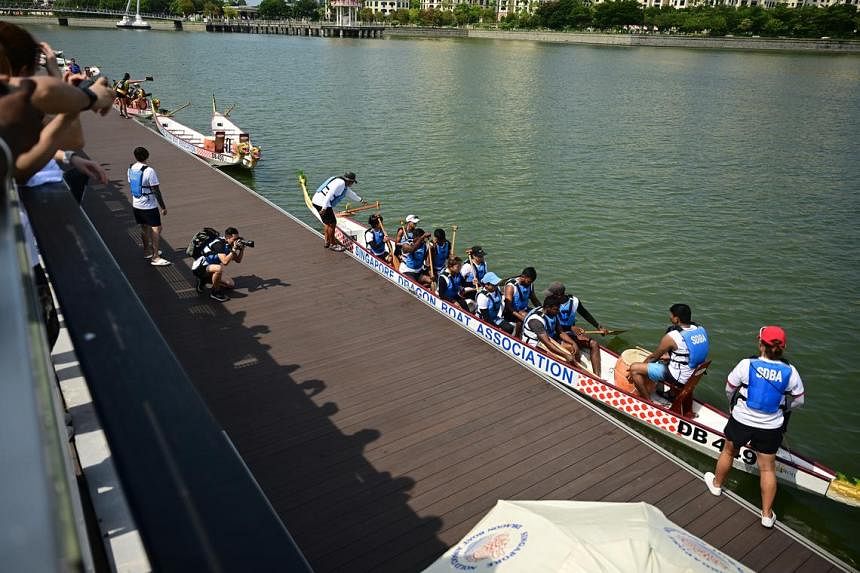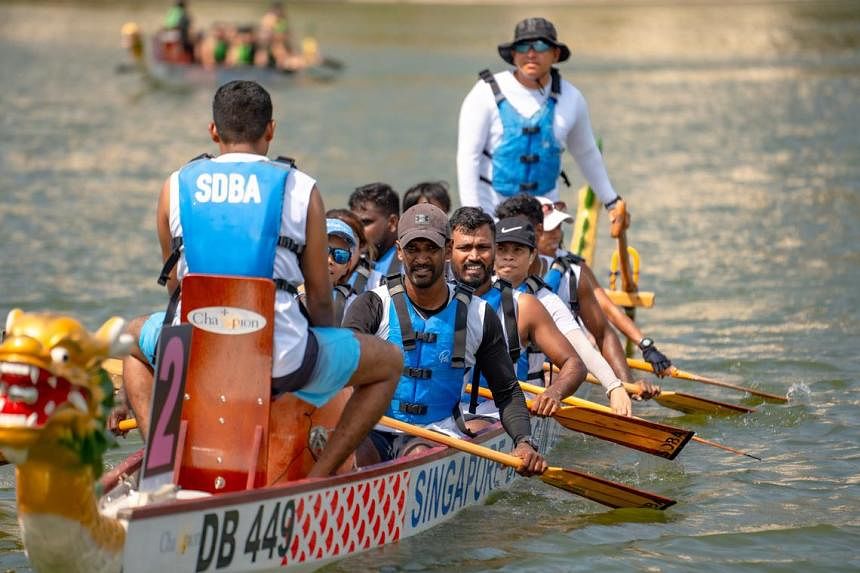'6 days we work hard, Sundays we paddle hard': Singapore's first migrant workers' dragon boat team debuts in competition


SINGAPORE — Between cooking and cleaning, domestic helper Surti would squeeze in sets of squats and 1km runs around her employer’s Housing Board block in Bukit Panjang.
And on her rest day on Sunday, the Indonesian, who goes by one name, would travel over an hour by train or bus to Bedok Reservoir for a gruelling three-hour dragon boat training session.
All her efforts over two months paid off on July 27, when she joined Singapore’s first migrant workers’ dragon boat team in their debut competition at a local sports festival Pesta Sukan 2024 at the Water Sports Centre in Kallang.
Surti, 37, who has been working here for 14 years, said: "I felt butterflies in my tummy. It was my very first time [joining a competition]. I wanted to do my best for the team."
Named Transient Paddlers Count Too, the team have five female domestic helpers from Indonesia, and six male migrant workers from India.
They were among 17 teams competing in the Singapore International Community Mixed Category, and were up against experienced rivals such as the British Dragons.
Though they did not reach the finals, their Singaporean coach Faris told The Straits Times that their maiden run was a triumph.
He proudly recalled how they shaved off two seconds in their second row compared with the first in the heats. The team emerged third among five contenders in the repechage round – where teams which failed in the heats fight for a spot in the final.
Faris, who declined to give his last name, said: "With the amount of training we have, and the equipment we had, we are supposed to be at the bottom. But it is a good place to start because from there, you can only go up."
The team started in July 2023 with Irene Ong, 73, a dragon boater and volunteer with non-profit organisation Transient Workers Count Too (TWC2). She thought the sport could help migrant workers bond.
Armed with about $20,000 from TWC2, Ong hired freelance coach Faris and recruited members via Facebook. About 100 people signed up.
Faris held land training sessions he described as "Hell Week", pushing recruits to complete 5km runs, push-ups and pull-ups. Only about 30 people completed the training. The numbers dwindled further when some could not commit to Sunday training due to work.
A Bangladeshi team member who designed their shirt, emblazoned with the motto "Six days we work hard, Sundays we paddle hard", had to drop out due to work.
The training sessions took a toll on workers who had labour-intensive jobs. Muthusamy Sathish, 33, a driver at an air-conditioner servicing company, struggled to return to work as his muscles would ache.
"On Tuesdays and Wednesdays, I cannot climb [up the stairs]. Sometimes, I [would] take MC," he said.
Another domestic helper on the team, Anggun Nisa, 34, said: "Even if I have body ache, I will just continue to do the housework. Not easy, but still okay."
The TWC2 volunteers would prepare nutritious snacks such as nuts, bananas and yoghurt for the team to help them recover.
With their limited budget, the team rented equipment from PAssionWave at Bedok Reservoir.
Faris said other dragon boat competitors buy their own paddles, which can cost more than $100 apiece and can be adjusted to a preferred height and length.
The team trained once a week due to the workers’ schedules, while others typically do so four to five times weekly, he noted.

Surti, who cares for an elderly man whom she affectionately calls "Grandpa", tried to exercise between her chores and caregiving duties.
She said: "If I [train] once in a blue moon, it is quite painful. So, I do bit by bit and treat it as a routine."
Her employer — the elderly man’s son — encouraged her to join the competition, and "Grandpa" told her: "I am so proud of you."
Anggun’s employer gave her extra allowance on weekends, and bought her waterproof shoes and gloves.

On July 27, the team completed the race, cheered on by TWC2 volunteers.
They missed second place by just one second, and are now looking for new sponsors to support their training for future competitions.
Tri Winarti, 40, a domestic helper and the team’s leader, said: "I want to show my migrant sisters and brothers — instead of wasting our day off, we can spend our time to do positive activities.
"We, as migrant workers, are being seen. We have talent."
This article was first published in The Straits Times. Permission required for reproduction.